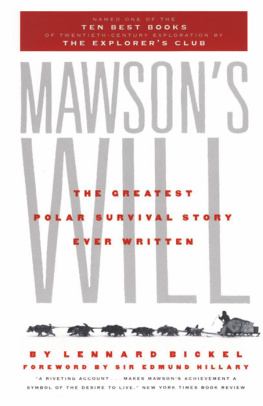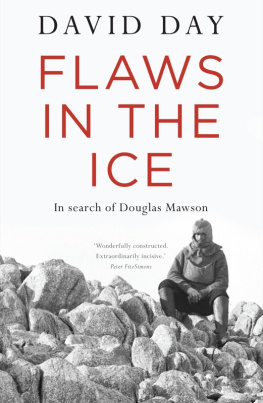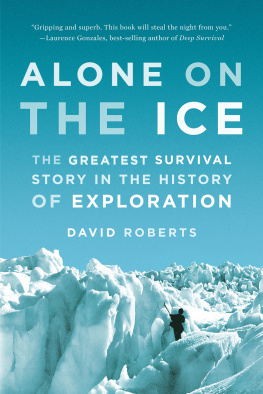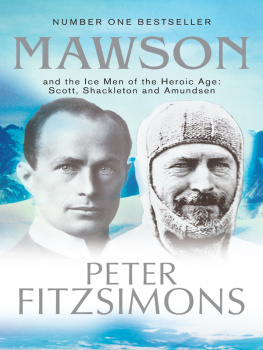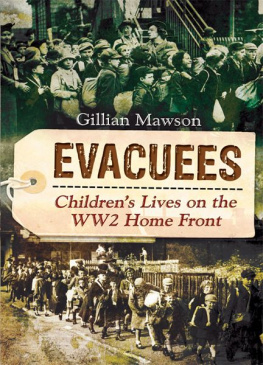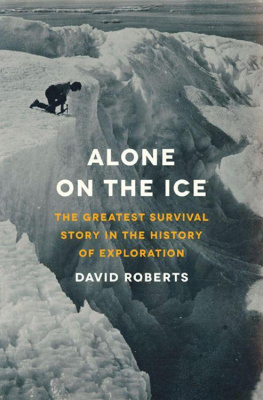Ive travelled the world twice over,
Met the famous: saints and sinners,
Poets and artists, kings and queens,
Old stars and hopeful beginners,
Ive been where no-ones been before,
Learned secrets from writers and cooks
All with one library ticket
To the wonderful world of books.
JANICE JAMES.
LENNARD BICKEL
THIS ACCURSED LAND
Complete and Unabridged

To
FRANCES CRAIGHEAD
who opened a door
Contents
The heroic period of Antarctic exploration occurred in the score of years at the beginning of this century a surprisingly short time ago when you think of how long man has been exploring his planet.
It was in that time that men first commenced their resounding battles, with all the incredible discomforts and hardships of the southern continent, and the period was dominated by the names of Amundsen, Scott, and Shackleton and mighty men they were, too.
But, there were others like these great heroes who were undertaking comparable feats of courage and leadership, who never achieved quite the same stature in the public mind because their objectives did not include that magic goal the South Pole. Outstanding among these men were two Australians, middle-aged Professor Edgworth David and Dr Douglas Mawson (later Sir Douglas). Their 1908 manhauling sledge journey to the South Magnetic Pole along with the Sydney medico, Dr Alistair Mackay, was a tremendous undertaking; it was on the return journey of some hundreds of miles of desperate travel back to the sea coast that Mawson showed to the full the strength, vitality, and leadership that were so pronounced a part of his character.
But Mawson had an even greater test ahead of him. From 1911 to 1913 at the same time as the Scott tragedy was coming to its sad conclusion Mawson led his Australasian Antarctic Expedition into the unknown country west of Cape Adare. It was an expedition that carried out a notable amount of scientific research which earned it a place amongst the great scientific expeditions of its day.
However, the most dramatic events had nothing to do with science they involved a mans battle against most appalling natural obstacles Mawsons own fight with death, as it is related in this book.
Some 320 miles east of Commonwealth Bay (which Mawson discovered) a companion crashed into a deep crevasse, with their tent, all the man food except one weeks sledging rations, all the dog food, and most of their equipment. With his other companion who was also doomed Mawsons journey back to winter quarters was a terrible journey. It became what is probably the greatest story of lone survival in Polar exploration.
That he survived at all was due only to his tremendous spirit and determination. Mawson earned his place of honour as one of the great men of the Antarctic.
SIR EDMUND HILLARY
Sydney, 1976
The Two Tents
The tents were a thousand miles apart. Between them was an awesome waste of ice-clad mountain ranges, huge glacial valleys, wide upland snow plains swept by polar wind; yet separated as they were they were tightly linked in the saga of the Antarctic.
Three men lay in each tent. Both tents were cut from green canvas, but the one in the south-east, pitched on the vast floating wasteland of the Ross Ice Shelf could not be seen; it was completely covered by the compacted snow of a long winter. It was quiet and still inside that tent. Not so in the shelter on a high ice plateau in the north-west; there, three men stretched out in reindeer-skin sleeping-bags and listened to the howl of a ferocious blizzard which slapped and banged the canvas cover against the bamboo poles. It was so noisy they could only communicate by shouting but, by now there was little left to say.
For two days they had huddled down trying to keep warm, trapped on the exposed plain while the winds from the polar plateau rushed unimpeded across the bottom of the world and filled the air with racing drift and stinging ice crystals. In that dense gloom they had neither night nor day and the hours were a long painful crawl. The winds were so strong that they could not ignite their kerosene-fed primus stove, and unable to melt snow for drinking water or to heat food, they waited in their bags and endured thirst, and eased hunger by nibbling hard-tack biscuits and small sticks of plain chocolate, listening always for some sign of a lessening in the gale.
Each one of these three men might easily have been in the other tent. Most certainly the leader of this trio and leader of the whole expedition, Dr Douglas Mawson, would have been had he not resisted strong pressure to abandon his own plans. But, for his two companions, he knew, it was a second choice. Both of them had originally sought to join the other party and missing selection narrowly had been warmly recommended to Mawson. He had found them first-class men, ideally suited to their allotted tasks, and so had been glad to appoint them.
Mawson was already an Antarctic veteran at the age of 30, tall and powerful, a commanding leader and experienced geologist. He was encamped with two men from different countries and with different backgrounds. Lieutenant Belgrave Edward Sutton Ninnis, of the British Royal Fusiliers, scion of an old Cornish tin-mining family, son of a London doctor, was unassuming, patient and loyal, and good with animals.
Dr Xavier Guillaume Mertz, a German-speaking law graduate from the Swiss city of Basel, was at 28 years of age a ski-champion and fine mountaineer. Ninnis and Mertz had become firm friends since they joined this expedition in London as joint handlers of the 30 Greenland husky dogs and crossed the world together on a long, slow voyage, tending and nursing the animals on the open deck. Now the dogs were snuggled down in the snow with only their muzzles showing. Both dogs and men waited for the wind to die and the air to clear when they could set their faces eastward and move into the unknown wilderness. All three men were strong, determined, conditioned by hard work in the long dark months of winter, impatient to open their journey of discovery.
Into the afternoon of that second day the gale blasted from the hinterland and the rivers of snow filled their world with white, frenzied chaos while they lay waiting under the rocking tent, cold, thirsty, hungry.
Over the tent in the south-east the afternoon was clear, calm and still, and a low sun bounced its vicious glare across the 250,000 square miles of the white wastes of the Ross Ice Shelf. It was a day to be engraved in polar history, a day of sad discovery. Ten men, with two ponies and two dog teams, had plodded into the glare since early that morning; for almost twelve hours they had trudged southward.
The searching ended when they found the cone of snow and beneath it the tent which had gone to the South Pole. Under the snows weight the tent walls sagged over the bodies of Captain Robert Falcon Scott, Dr E. A. Wilson, and Lieutenant Henry Bowers. Diaries with the bodies told the now classic tale of the crushing blow of finding Amundsen had reached the Pole weeks before them, of the struggle back in which two of the party of five had perished. Now, here were the three of them dead only eleven miles from food and fuel at One Ton Depot.
The bamboo poles of the tent were pulled away; the green canvas became a shroud, and a cairn of snow was built over them. There was a short burial service and the dead were left to become integral with the ice. The historian of the Scott expedition, Apsley Cherry-Garrard, described it as a tomb that kings might envy and a
Next page

